|
![]()
Britain on the Slow Track
![]()
Stephen Berry
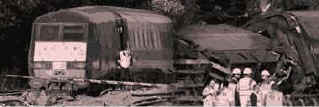
On October 17th 2000 at Hatfield, just north of London, the rear eight coaches of an intercity express train travelling at 115 mph came off the rails. Four people were killed and 34 were injured. The cause of the crash was identified as a broken rail weakened by internal cracking. Railtrack, the company set up at privatisation to manage the track and signals of Britain's railways, very quickly identified 3,000 sections of rail which might be similarly weakened and needed replacing. Whilst the emergency work was in progress, speed limits of 20 mph were put in place across much of the U.K. rail network.
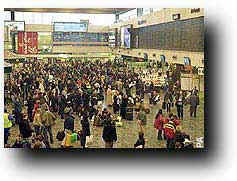
In the run-up to Christmas 2000, complete chaos reigned on the British railways Many services were cancelled and if you were lucky enough to catch an overcrowded train, you were likely to find that your journey was taking longer than it did in the good old days of steam engines. As someone who commutes daily into central London, I can bear witness that a train journey at that time was not something to be contemplated by a person of a nervous disposition. I confess that I saw more than one stiff upper-lip curl under the pressure and, even more alarmingly, furled umbrellas were occasionally raised in righteous anger. Not surprisingly, 25 per cent of rail commuters chose to switch from rail to road, but this only caused the roads to become jammed. After Christmas the problems have eased, but Steve Marshall, the head of Railtrack, remarked, "To get things pretty much back to normal, as far as everyone is concerned, that's going to be Easter." In a recent opinion poll, a clear majority of an exasperated public expressed its anger by demanding that the railways be renationalised.
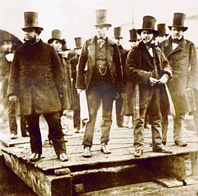 << Brunel (with
<< Brunel (with
cigar) and his management team
Britain's little local difficulty is only the latest of a series of ups and downs in the long and colourful history of the railways. It is generally agreed that the world's first practical steam railway was the Stockton and Darlington line in the north of England, opened in 1825. George Stephenson's steam engine Locomotion was able to haul loaded goods wagons and passenger carriages on metal rails at the magnificent speed of five miles an hour and justify Stephenson's proud boast that it could do the work of 50 horses. From these small beginnings, Victorian engineers and financiers in the 19th century developed a rail network which rapidly supplanted the waterways and provided the main transport system of the industrial revolution. Typical of these great men was Isambard Kingdom Brunel. Brunel, apart from being the chief engineer of the Great Western Railway, built a number of impressive bridges, a tunnel under the Thames and three of the greatest ships of the day. He never sought public honours and he numbered amongst his pet hates bureaucracy, statutory restriction, official approval and government inspectors. The efforts of these entrepreneurs were not restricted to the UK. The early railways throughout Latin America and Europe were often financed by British capital and built by British engineers.
If the history of railways in the 19th century is a record of the triumphant achievements of private capital and entrepreneurial ingenuity, the 20th century is a story of decline and increasing government interference. The full account of the disastrous effects of the two World Wars on British society has yet to be told, but of one thing I am clear; they gave a tremendous boost to statist trends in the UK. In 1914 de facto nationalisation of the railways was enacted for the duration of the war with direct government control not ended until 1921. In the meantime, indirect control was ensured by a Ministry of Transport, created for the first time in 1919. In 1939 the beginning of World War Two saw the railways taken over once more by the government, and this time there was to be no reprieve. On the 1st January 1948, the railways were nationalised. For almost 50 years there followed a steady decline. British Rail become a byword for inefficiency with the British Rail sandwich a national joke. And there was the clear and ever present danger which attends any state monopoly. A national strike would at any moment bring the whole network grinding to a halt.
In 1994 the wheel turned full circle and the rail system was returned to private ownership by the then Conservative government. This was both bad and good news. The bad was that the government chose an unusual and complex method of organising the railways. The system was fragmented into 25 train operators and a single monopoly track provider. Most railways around the world have the trains and track owned by the same company, and indeed this was the system in the UK prior to nationalisation. Amongst other problems, the present set-up has meant that the railways seem to have more regulators and politicians meddling than in any other UK privatised industry.
The good news is that the new train operators have introduced a 1,000 extra services per day compared with the last year before privatisation. Last year, passenger numbers were up by 30 per cent and freight movement by 33 per cent. Railtrack is under pressure from train operators to improve repairs and speed up train schedules, but here the structure imposed by privatisation is a hindrance. Railtrack feels that it has not felt the full benefit of the increase in passengers and freight and consequently has not acted with the required alacrity.
The Hatfield accident and aftermath must be seen against the backdrop of a heavily regulated privatised industry gingerly finding its feet. Broken rails are relatively common and there are evidently two of them somewhere in the country each week. But they have only caused 6 fatalities in the last 30 years (including Hatfield). The speed restrictions were a massive overkill, the reaction of an industry under political pressure. It seems clear that if the rail network had been returned to the position it had prior to nationalisation, there would not have been the divorce between track and train operators and economic incentives would have made the national rail go-slow less likely.

But the birth pangs of a newly privatised industry is not the only question to consider here. People in the West live in a culture which thrives on disasters. Air crashes, rail accidents, earthquakes and hurricanes are all hot news. If there were a channel solely devoted to such disasters around the world, it would rival the soap operas for popularity. Paradoxically, whilst the media feeds the public's obsession with disaster, all forms of travel are becoming increasingly safer. Although road vehicle ownership in the UK is at an all time high, there were around 3,000 deaths on the roads last year (the lowest ever) and this accident rate has been falling as long as I can remember.
Interestingly, the safety of UK railways was emphasized by a remarkable and scarcely repeatable crash which occurred at Selby, Yorkshire in February 2001. A freakish series of events involved a car coming off the road, sliding down an embankment and coming to rest, partially on a rail line. An intercity train travelling at 125 mph was deflected and derailed by the car, but its momentum caused it to continue and hit a freight train which was travelling in the opposite direction at 70 mph. The speed of the collision was roughly twice that of a car travelling at the legal limit on a motorway, and the combined mass of the trains involved was 2,000 times that of a car. A professor of mechanical engineering at Imperial College calculated the kinetic energy of the collision as being 8,000 times greater than that of a car hitting a wall at 75 mph. It speaks volumes for the skill of the carriage designers that the fatalities (10) were so few. Statistically, it is extremely improbable that a UK rail traveller will ever be involved in an accident. But even if you are involved in the most horrific rail accident, improved safety features mean that your chances of surviving unscathed are extremely good.
Yet, the media coverage of disasters has produced a political problem. Although risk is intrinsic to progress – the Titanic sinks, Concorde crashes and there are earthquakes in San Francisco – it appears that many people feel they can have a risk-free world. And politicians, being who they are, tend to pander to the voters' whims. It is with some regret that I have to point out that, notwithstanding the fancies of voters and politicians, delusions have a habit of generating unpleasant consequences.
The rail go-slow sent frustrated commuters on to the road causing them to use a mode of transport which is, statistically speaking, 10 times more dangerous than the railways. This is not to say that driving on the roads is dangerous in the UK. It is not. Driving cars is very safe in the UK, but travelling by rail is even safer. The rail go-slow will have produced more deaths in the name of safety than if the trains and maintenance programmes had simply been left to run as normal. The brutal political truth is that road accidents are generally not covered by the TV cameras and are therefore not political problems. A rail accident is a media event and rather embarrassing for politicians who insist on being at the centre of ‘Britain's transport policy'. More deaths, but less political hassle; that is the trade-off made by politicians as a result of the Hatfield crash and it does not make for a pretty story.
Each age has the conceit that it has ideas which are more enlightened than those of previous generations. We should recognise that we may also have ideas which are rather inferior to some of those of the past. In the UK and Europe there is hysteria about the risks posed by genetically modified crops. It is barely noted that these crops already provide tremendous benefits and that any new problems might admit of solutions. There is a scary story in the media at the moment that long-haul plane travellers are proving susceptible to blood clots. Predictably, some passengers are already planning to sue the pants off the airlines. One might forget for a moment what a tremendous improvement mass air travel has brought to the quality of most people's life. One might remember that a litigious culture which panics when faced with the smallest failure might also make innovation less worthwhile.
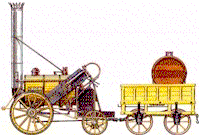 In 1830 the Liverpool and Manchester railway was opened to link these two great industrial centres in the North of England. The opening ceremony attracted such 19th century luminaries as the Duke of Wellington and a future Prime Minister, Sir Robert Peel. Also present was William Huskisson, a government minister who had been both a champion of the new railways and a trenchant supporter of Free Trade. Tragedy occurred when Huskisson was struck down by Stephenson's train, the Rocket, and later died. We should remember that this accident did not halt the hugely beneficial railway development of the 19th century. The Hatfield crash and the subsequent panic should not be allowed to prevent the necessary rejuvenation of the British railroads in the 21st.
In 1830 the Liverpool and Manchester railway was opened to link these two great industrial centres in the North of England. The opening ceremony attracted such 19th century luminaries as the Duke of Wellington and a future Prime Minister, Sir Robert Peel. Also present was William Huskisson, a government minister who had been both a champion of the new railways and a trenchant supporter of Free Trade. Tragedy occurred when Huskisson was struck down by Stephenson's train, the Rocket, and later died. We should remember that this accident did not halt the hugely beneficial railway development of the 19th century. The Hatfield crash and the subsequent panic should not be allowed to prevent the necessary rejuvenation of the British railroads in the 21st.
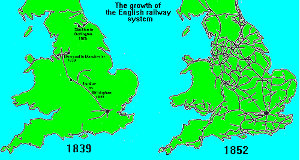
 Top 50 books of all time : by Old Hickory:-
Top 50 books of all time : by Old Hickory:-
"I have limited the selection to the books I have read. I keep to the norm of not recommending to others books I have yet to read. Clearly, books I have not read by now suggests a judgement of some sort."
Further reading: "An intelligent and good-natured analysis of the follies that arise from a lack of understanding (sometimes a wilful lack) of science and mathematics. This pleasant book would improve the quality of thinking of virtually anyone” Isaac Asimov |
|
|
|
|
|
|
|
|